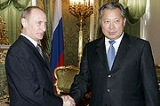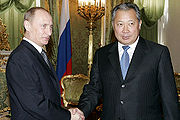
Kyrgyzstan–Russia relations
Encyclopedia
Kyrgyzstan–Russia relations is the relationship between the two countries, Kyrgyzstan
and Russia
.
Whereas the other Central Asia
n republic
s have sometimes complained of Russian interference, Kyrgyzstan has more often wished for more attention and support from Moscow than it has been able to obtain. For all the financial support that the world community has offered, Kyrgyzstan remains economically dependent on Russia, both directly and through Kazakhstan
. In early 1995, Askar Akayev
, the then President of Kyrgyzstan
, attempted to sell Russian companies controlling shares in the republic's twenty-nine largest industrial plants, an offer that Russia refused.
Akayev has been equally enthusiastic about more direct forms of reintegration, such as the Euro-Asian Union that the President of Kazakhstan
, Nursultan Nazarbayev
, proposed in June 1994. Because Kyrgyzstan presumably would receive much more from such a union than it would contribute, Akayev's enthusiasm has met with little response from Russia and the other, larger states that would be involved in such an arrangement. Akayev's invitation for Russian border guards to take charge of Kyrgyzstan's Chinese
border, a major revision of his policy of neutrality, was another move toward reintegration.
The Kyrgyzstani government also has felt compelled to request Russia's economic protection. The harsh reality of Kyrgyzstan's economic situation means that the nation is an inevitable international client state, at least for the foreseeable future. Despite concerted efforts to seek international "sponsors," Akayev has not received much more than a great deal of international good will. Even if the president had not lived seventeen years in Russia himself and even if his advisers, family, and friends were not all Soviet-era intellectuals with a high degree of familiarity with Russia, economic necessity probably would push Kyrgyzstan further toward Russia.
 On his February 1994 visit to Moscow
On his February 1994 visit to Moscow
, Akayev signed several economic agreements. Having promised the republic a 75 billion ruble
line of credit (presumably for use in 1994) and some US$65 million in trade agreements, Russia also promised to extend to Kyrgyzstan most favoured nation
status for the purchase of oil
and other fuels. For its part, Kyrgyzstan agreed to the creation of a Kyrgyz-Russian investment company
, which would purchase idle defence-related factories in the republic to provide employment for the increasingly dissatisfied Russian population of Kyrgyzstan. In early 1995, Prime Minister
Apas Jumagulov
of Kyrgyzstan and Prime Minister
Viktor Chernomyrdin
of Russia signed a series of agreements establishing bilateral coordination of economic reform in the two states, further binding Kyrgyzstan to Russia. After lobbying hard for inclusion, Kyrgyzstan became a member of the customs union that Russia, Belarus, and Kazakhstan established in February 1996.
For its part, Russia sees aid to Kyrgyzstan as a successful precedent in its new policy of gaining influence in its "near abroad," the states that once were Soviet republics. Russia does not want a massive in-migration of Russians from the new republics; some 2 million ethnic Russians moved back to Russia between 1992 and 1995. Akayev, on the other hand, must find a way to stem the loss of his Russian population, which already has caused an enormous deficit of doctor
s, teacher
s, and engineer
s.
 For these reasons, despite opposition from Kyrgyz nationalists and other independence-minded politicians, in 1995 Akayev granted the request of Russian president Boris Yeltsin
For these reasons, despite opposition from Kyrgyz nationalists and other independence-minded politicians, in 1995 Akayev granted the request of Russian president Boris Yeltsin
to review the constitutional provision making Kyrgyz
the sole official language
. Early in 1996, Kyrgyzstan took legal steps toward making Russian the republic's second official language, subject to amendment of the constitution
. That initiative coincided with the customs union signed with Russia, Kazakhstan, and Belarus in February 1996. The long-term success of Akayev's search for reintegration is questionable because of Kyrgyzstan's minimal strategic importance and the potential cost to an outside country supporting the republic's shaky economy.
In February 2009 the Russian government pledged to write off Kyrgyzstan's $180 million debt as well as promising to lend a further $2 billion, give $150 million in direct aid and subsidise the building of the Kambarata-1 hydropower plant at the Kambaratinsk Dam
.
Russia has an embassy in Bishkek
and a consulate in Osh
, and Kyrgyzstan has an embassy in Moscow
, a consulate in Ekaterinburg, and a vice-consulate in Novosibirsk
.
east of Bishkek
.
Kyrgyzstan
Kyrgyzstan , officially the Kyrgyz Republic is one of the world's six independent Turkic states . Located in Central Asia, landlocked and mountainous, Kyrgyzstan is bordered by Kazakhstan to the north, Uzbekistan to the west, Tajikistan to the southwest and China to the east...
and Russia
Russia
Russia or , officially known as both Russia and the Russian Federation , is a country in northern Eurasia. It is a federal semi-presidential republic, comprising 83 federal subjects...
.
Whereas the other Central Asia
Central Asia
Central Asia is a core region of the Asian continent from the Caspian Sea in the west, China in the east, Afghanistan in the south, and Russia in the north...
n republic
Republic
A republic is a form of government in which the people, or some significant portion of them, have supreme control over the government and where offices of state are elected or chosen by elected people. In modern times, a common simplified definition of a republic is a government where the head of...
s have sometimes complained of Russian interference, Kyrgyzstan has more often wished for more attention and support from Moscow than it has been able to obtain. For all the financial support that the world community has offered, Kyrgyzstan remains economically dependent on Russia, both directly and through Kazakhstan
Kazakhstan
Kazakhstan , officially the Republic of Kazakhstan, is a transcontinental country in Central Asia and Eastern Europe. Ranked as the ninth largest country in the world, it is also the world's largest landlocked country; its territory of is greater than Western Europe...
. In early 1995, Askar Akayev
Askar Akayev
Askar Akayevich Akayev served as the President of Kyrgyzstan from 1990 until his overthrow in the March 2005 Tulip Revolution....
, the then President of Kyrgyzstan
President of Kyrgyzstan
The President of Kyrgyzstan is the head of state and the highest official of Kyrgyzstan. The President, according to the constitution, "is the symbol of the unity of people and state power, and is the guarantor of the Constitution of the Kyrgyz Republic, and of an individual and citizen." The...
, attempted to sell Russian companies controlling shares in the republic's twenty-nine largest industrial plants, an offer that Russia refused.
Akayev has been equally enthusiastic about more direct forms of reintegration, such as the Euro-Asian Union that the President of Kazakhstan
President of Kazakhstan
President of Kazakhstan is the head of state, supreme commander-in-chief and holder of the highest office within the Kazakhstan. The authorities of this position are described in special section of Constitution of Kazakhstan....
, Nursultan Nazarbayev
Nursultan Nazarbayev
Nursultan Abishuly Nazarbayev has served as the President of Kazakhstan since the nation received its independence in 1991, after the fall of the Soviet Union...
, proposed in June 1994. Because Kyrgyzstan presumably would receive much more from such a union than it would contribute, Akayev's enthusiasm has met with little response from Russia and the other, larger states that would be involved in such an arrangement. Akayev's invitation for Russian border guards to take charge of Kyrgyzstan's Chinese
People's Republic of China
China , officially the People's Republic of China , is the most populous country in the world, with over 1.3 billion citizens. Located in East Asia, the country covers approximately 9.6 million square kilometres...
border, a major revision of his policy of neutrality, was another move toward reintegration.
The Kyrgyzstani government also has felt compelled to request Russia's economic protection. The harsh reality of Kyrgyzstan's economic situation means that the nation is an inevitable international client state, at least for the foreseeable future. Despite concerted efforts to seek international "sponsors," Akayev has not received much more than a great deal of international good will. Even if the president had not lived seventeen years in Russia himself and even if his advisers, family, and friends were not all Soviet-era intellectuals with a high degree of familiarity with Russia, economic necessity probably would push Kyrgyzstan further toward Russia.

Moscow
Moscow is the capital, the most populous city, and the most populous federal subject of Russia. The city is a major political, economic, cultural, scientific, religious, financial, educational, and transportation centre of Russia and the continent...
, Akayev signed several economic agreements. Having promised the republic a 75 billion ruble
Ruble
The ruble or rouble is a unit of currency. Currently, the currency units of Belarus, Russia, Abkhazia, South Ossetia and Transnistria, and, in the past, the currency units of several other countries, notably countries influenced by Russia and the Soviet Union, are named rubles, though they all are...
line of credit (presumably for use in 1994) and some US$65 million in trade agreements, Russia also promised to extend to Kyrgyzstan most favoured nation
Most favoured nation
In international economic relations and international politics, most favoured nation is a status or level of treatment accorded by one state to another in international trade. The term means the country which is the recipient of this treatment must, nominally, receive equal trade advantages as the...
status for the purchase of oil
Oil
An oil is any substance that is liquid at ambient temperatures and does not mix with water but may mix with other oils and organic solvents. This general definition includes vegetable oils, volatile essential oils, petrochemical oils, and synthetic oils....
and other fuels. For its part, Kyrgyzstan agreed to the creation of a Kyrgyz-Russian investment company
Investment company
An investment company is a company whose main business is holding securities of other companies purely for investment purposes. The investment company invests money on behalf of its shareholders who in turn share in the profits and losses....
, which would purchase idle defence-related factories in the republic to provide employment for the increasingly dissatisfied Russian population of Kyrgyzstan. In early 1995, Prime Minister
Prime Minister of Kyrgyzstan
The Prime Minister of Kyrgyzstan is the head of government of Kyrgyzstan. Generally, the President is in a stronger position than the Prime Minister in Kyrgyzstan. The president is allowed to appoint the Prime Minister temporarily, and his appointment is known as the acting Prime Minister...
Apas Jumagulov
Apas Jumagulov
Apas Jumagulov served as the Prime Minister of Kyrgyzstan from 14 December 1993 to 24 March 1998....
of Kyrgyzstan and Prime Minister
Prime Minister of Russia
The Chairman of the Government of the Russian Federation The use of the term "Prime Minister" is strictly informal and is not allowed for by the Russian Constitution and other laws....
Viktor Chernomyrdin
Viktor Chernomyrdin
Viktor Stepanovich Chernomyrdin was the founder and the first chairman of the Gazprom energy company, the longest serving Prime Minister of Russia and Acting President of Russia for a day in 1996. He was a key figure in Russian politics in the 1990s, and a great contributor to the Russian...
of Russia signed a series of agreements establishing bilateral coordination of economic reform in the two states, further binding Kyrgyzstan to Russia. After lobbying hard for inclusion, Kyrgyzstan became a member of the customs union that Russia, Belarus, and Kazakhstan established in February 1996.
For its part, Russia sees aid to Kyrgyzstan as a successful precedent in its new policy of gaining influence in its "near abroad," the states that once were Soviet republics. Russia does not want a massive in-migration of Russians from the new republics; some 2 million ethnic Russians moved back to Russia between 1992 and 1995. Akayev, on the other hand, must find a way to stem the loss of his Russian population, which already has caused an enormous deficit of doctor
Physician
A physician is a health care provider who practices the profession of medicine, which is concerned with promoting, maintaining or restoring human health through the study, diagnosis, and treatment of disease, injury and other physical and mental impairments...
s, teacher
Teacher
A teacher or schoolteacher is a person who provides education for pupils and students . The role of teacher is often formal and ongoing, carried out at a school or other place of formal education. In many countries, a person who wishes to become a teacher must first obtain specified professional...
s, and engineer
Engineer
An engineer is a professional practitioner of engineering, concerned with applying scientific knowledge, mathematics and ingenuity to develop solutions for technical problems. Engineers design materials, structures, machines and systems while considering the limitations imposed by practicality,...
s.

Boris Yeltsin
Boris Nikolayevich Yeltsin was the first President of the Russian Federation, serving from 1991 to 1999.Originally a supporter of Mikhail Gorbachev, Yeltsin emerged under the perestroika reforms as one of Gorbachev's most powerful political opponents. On 29 May 1990 he was elected the chairman of...
to review the constitutional provision making Kyrgyz
Kyrgyz language
Kyrgyz or Kirgiz, also Kirghiz, Kyrghiz, Qyrghiz is a Turkic language and, together with Russian, an official language of Kyrgyzstan...
the sole official language
Official language
An official language is a language that is given a special legal status in a particular country, state, or other jurisdiction. Typically a nation's official language will be the one used in that nation's courts, parliament and administration. However, official status can also be used to give a...
. Early in 1996, Kyrgyzstan took legal steps toward making Russian the republic's second official language, subject to amendment of the constitution
Constitution of Kyrgyzstan
The Constitution of Kyrgyzstan is the supreme law of the Kyrgyz Republic . The constitution in force until 2010 was passed by referendum on 21 October 2007 and it is based on the first post-Soviet constitution originally adopted on 5 May 1993, a year and a half after the country had gained...
. That initiative coincided with the customs union signed with Russia, Kazakhstan, and Belarus in February 1996. The long-term success of Akayev's search for reintegration is questionable because of Kyrgyzstan's minimal strategic importance and the potential cost to an outside country supporting the republic's shaky economy.
In February 2009 the Russian government pledged to write off Kyrgyzstan's $180 million debt as well as promising to lend a further $2 billion, give $150 million in direct aid and subsidise the building of the Kambarata-1 hydropower plant at the Kambaratinsk Dam
Kambaratinsk Dam
The Kambaratinsk Dam is the sixth planned dam on the Naryn River in central Kyrgyzstan. It will be one of the largest dams in the world at the time of its completion, standing approximately high and containing about of rock and earth...
.
Russia has an embassy in Bishkek
Bishkek
Bishkek , formerly Pishpek and Frunze, is the capital and the largest city of Kyrgyzstan.Bishkek is also the administrative centre of Chuy Province which surrounds the city, even though the city itself is not part of the province but rather a province-level unit of Kyrgyzstan.The name is thought to...
and a consulate in Osh
Osh
Osh is the second largest city in Kyrgyzstan, located in the Fergana Valley in the south of the country and often referred to as the "capital of the south". The city is at least 3,000 years old, and has served as the administrative center of Osh Province since 1939...
, and Kyrgyzstan has an embassy in Moscow
Embassy of Kyrgyzstan in Moscow
The Embassy of the Kyrgyz Republic in Moscow is the chief diplomatic mission of Kyrgyzstan in the Russian Federation. It is located at 64 Bolshaya Ordynka Street in the Yakimanka District of Moscow.- External links :...
, a consulate in Ekaterinburg, and a vice-consulate in Novosibirsk
Novosibirsk
Novosibirsk is the third-largest city in Russia, after Moscow and Saint Petersburg, and the largest city of Siberia, with a population of 1,473,737 . It is the administrative center of Novosibirsk Oblast as well as of the Siberian Federal District...
.
Military cooperation
Since 2003, Russian Air Force units have been stationed at Kant Air BaseKant Air Base
Kant Air Base is a military air base in Ysyk-Ata District of Chuy Oblast in Kyrgyzstan. It is located just south of the city of Kant, some 20 km east of downtown Bishkek.- History :...
east of Bishkek
Bishkek
Bishkek , formerly Pishpek and Frunze, is the capital and the largest city of Kyrgyzstan.Bishkek is also the administrative centre of Chuy Province which surrounds the city, even though the city itself is not part of the province but rather a province-level unit of Kyrgyzstan.The name is thought to...
.

